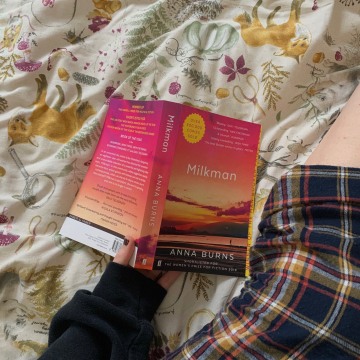
Oh God, how do I even begin to formulate my thoughts on this…
Milkman is the story of an unnamed eighteen-year-old girl living in an unnamed city. She has attracted the unwanted and unavoidable attention of a powerful and frightening older man, Milkman. In this community, where suggestions quickly become fact, where gossip and hearsay can lead to terrible consequences, what can she do to stop a rumour once it has started? Milkman is persistent, the word is spreading, and she is no longer in control…
This was a very difficult read. It’s very modern in that sense. Anna Burns wants you to work for the deeper meaning of the story. She does not hand it to you on a plate, like your average nineteenth-century writer does (which, as you’ll know, is my fave type of read). The language is overly flowery and there’s some odd metaphors stuck in there. I was lost a lot of the time, but I’m thankful that the audiobook managed to keep me on track. I don’t think I would have finished it without the help of my free trial on Scribd.
But this difficulty added to the complexity of the novel. The jarring narration and the weird images made the core of the story all the more riveting. A teenage girl who’s livelihood is affected by gossip (about her sexuality) and is essentially being controlled by a man. She lives in fear of this man, wondering when he will next pop up. Milkman knows her routine; she evens quits running just to avoid him. The simple fact that women, especially young women, are forced to give up her hobby because a man has intruded in her space is a familiar one.
The feminist undertones were strong and powerful in this one.
The lack of names allows us, as readers, to place ourselves within this situation. To mark the similarities between our society and this unnamed one.
But is it unnamed?
It’s very obvious that Burns’ society is inspired by that which she grew up in: Northern Ireland. All this renouncers, enemy-of-the-state, “over the boarder” talk refers to the Sectarian divide in Northern Ireland that was, and still is, rife in areas like Belfast. The novel is *hugely* political, exploring the brutality, violence and tension of The Troubles in 1960s Northern Ireland. I liked this the most.
Everything I know about the Sectarian divide is from my boyfriend, a passionate Protestant who grew up in the Shankhill. Milkman gave me an alternative view on this. It wasn’t focused so much on Catholics this and Protestants that, but it was “you can’t do this” or “you can’t be named this” because it’ll “mean this or that”. It was more subtle. I don’t tend to reach for political reads all that much but, because this history is familiar to me, I quickly grew interested in the voice of the story.
Milkman is a very long-winded book. It reads like a 500 page novel, despite being 350. It only has seven chapters, and hardly any breaks in the paragraphs. It’s a tough read; that’s why I recommend the audiobook (which, by the way, is read by a Northern Irish woman, which really helps put you in the setting and situation).
I do think it is an excellent read though. I enjoyed my reading experience of it. I’m going to hold onto my copy of this; I’m gonna re-read it some day and hope that it all clicks into place. But, for now, I think this’ll be three and a half stars from me!
Milkman isn’t my usual read, is it yours? Have you already read it? What’s your thoughts on it? Let’s discuss it below!
Thanks for reading, Lauren X